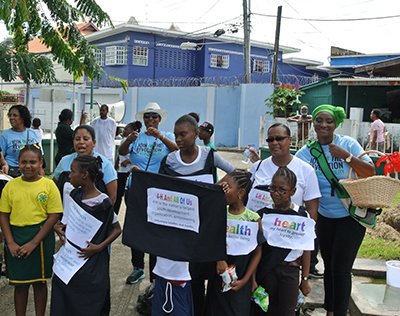4-H around the world: Trinidad and Tobago 4-H
4-H has spread around the world. Let’s explore 4-H in Trinidad and Tobago.

The Michigan State University Extension series exploring 4-H around the world continues, moving from 4-H in the Virgin islands, St. Croix to the islands of Trinidad and Tobago 4-H. Did you know they have had 4-H Trinidad and Tobago since 1945? Did you know they have a 4-H Youth Development Camp Trinidad and Tobago? Did you know they have a 4-H Trinidad and Tobago Facebook page to connect with? Let’s explore!
How does 4-H look in Trinidad and Tobago? Nina Khan, 4-H Coordinator, St. George West, shared about the 4-H organization of Trinidad and Tobago.
The 4-H organization of Trinidad and Tobago can be characterized as a unique cooperative relationship between the Ministry of Agriculture, Land and Fisheries and Ministry of Education in Trinidad, the Divisions of the Tobago House of Assembly responsible for Agriculture and Education, in Tobago, and the 4-H Leaders’ Council of Trinidad and Tobago.
4-H started in Trinidad and Tobago in 1945 and operated under the Ministry of Education until 1950 when it went into decline. In 1969, it restarted under the Extension Services Division of the Ministry of Agriculture. In 1993, the National Council for 4-H was formed. Today, the 4-H Leaders Council of Trinidad and Tobago is a duly constituted non-governmental organization, incorporated under the Companies Act, 1995 of Trinidad and Tobago, on Nov. 16, 2004, registered at the Ministry of Legal Affairs. It consists of an executive (director) elected at biennial general meetings and a general membership of voluntary leaders who are mostly teachers of primary schools and some secondary schools. The council is responsible for organizing a national program for the 4-H organization in collaboration with the Ministry of Agriculture, Land and Fisheries, and Tobago House of Assembly’s Division of Agriculture. It does not receive a government subvention, however, and so primarily depends on financial support from the Ministry of Agriculture, Land and Fisheries and Tobago House of Assembly, and registration fees of clubs and voluntary leaders.
 The principal stake holders of the 4-H program are the voluntary leaders and 4-Hers, the majority of whom are from schools within the formal education system. The primary unit of the 4-H program is the 4-H club, which consists of young people between the ages of 7 to 19 years, led by a voluntary leader. Each leader and 4-H club belong to a particular county 4-H council, based on their geographic location. In Trinidad, there are currently seven 4-H county voluntary leaders councils: St. George (East/West), St. Andrew/St. David, Caroni, Nariva Mayaro, St. Patrick East, St. Patrick West and Victoria. In Tobago, there is just one Tobago 4-H voluntary leaders council. Each of these 4-H councils forms part of a National 4-H Council called the 4-H Leaders Council of Trinidad and Tobago. The National 4-H Council is itself part of a wider Caribbean 4-H Council, comprised of representatives of National 4-H Councils of various Caribbean countries.
The principal stake holders of the 4-H program are the voluntary leaders and 4-Hers, the majority of whom are from schools within the formal education system. The primary unit of the 4-H program is the 4-H club, which consists of young people between the ages of 7 to 19 years, led by a voluntary leader. Each leader and 4-H club belong to a particular county 4-H council, based on their geographic location. In Trinidad, there are currently seven 4-H county voluntary leaders councils: St. George (East/West), St. Andrew/St. David, Caroni, Nariva Mayaro, St. Patrick East, St. Patrick West and Victoria. In Tobago, there is just one Tobago 4-H voluntary leaders council. Each of these 4-H councils forms part of a National 4-H Council called the 4-H Leaders Council of Trinidad and Tobago. The National 4-H Council is itself part of a wider Caribbean 4-H Council, comprised of representatives of National 4-H Councils of various Caribbean countries.
There are approximately 120 active 4-H clubs in Trinidad and Tobago with over 2,500 4-Hers who participate in agriculture and related learning activities on an on-going basis. These activities include establishing and maintaining schools gardens, aquaculture, producing seedlings and ornamentals, composting, rabbit rearing, plant propagation, grow box culture and agro-processing. Some clubs have also included a social outreach component to their program involving visits to homes for the aged and provision of food hampers for distribution to the poor. Projects focused on the care and preservation of the environment are very popular with 4-Hers. Recycling, landscaping, beach clean-ups, turtle watching, organic gardening and educational field visits have been and continue to be standard club activities.
If you would like to learn more about Trinidad, contact Michigan 4-H program coordinator Kwesi Lee from Berrien County 4-H, who is from the island. 4-H is active in making differences empowering youth and adult volunteers in countries around the world!
Other global educational opportunities can also be found on the MSU Extension Global and Cultural Education website. For more information about 4-H learning opportunities and other 4-H programs, contact your county MSU Extension office.
MSU Extension and the Michigan 4-H Youth Development program help to prepare youth as positive and engaged leaders and global citizens by providing educational experiences and resources for youth interested in developing knowledge and skills in these areas. To learn about the positive impact of Michigan 4-H youth leadership, civic engagement, citizenship and global/cultural programs, read our 2015 Impact Report: “Developing Civically Engaged Leaders.”
Other articles in this series:
- 4-H around the world: Africa
- 4-H around the world: St. Croix
- 4-H around the world: Michigan-Belize connection
- 4-H around the world: Costa Rica
- 4-H around the world: Canada
- 4-H around the world: Norway
- 4-H around the world: South Korea
- 4-H around the world: Finland
- 4-H around the world: Nepal – Part 1
- 4-H around the world: Nepal – Part 2



 Print
Print Email
Email




